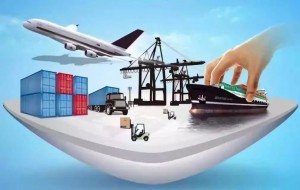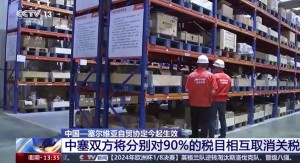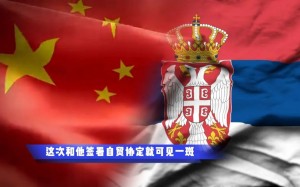The Free Trade Agreement between the Government of the People’s Republic of China and the Government of the Republic of Serbia signed by China and Serbia has completed their respective domestic approval procedures and officially entered into force on July 1, according to the Ministry of Commerce.
After the agreement enters into force, the two sides will gradually eliminate tariffs on 90 percent of the tax lines, of which more than 60 percent of the tax lines will be eliminated immediately on the day of the agreement’s entry into force. The final proportion of zero-tariff imports on both sides will reach about 95%.
The China-Serbia free trade Agreement also covers a wide range of products. Serbia will include cars, photovoltaic modules, lithium batteries, communications equipment, mechanical equipment, refractory materials and some agricultural and aquatic products, which are China’s key concerns, in the zero tariff, and the tariff on relevant products will be gradually reduced from the current 5-20% to zero.
China will include generators, motors, tires, beef, wine and nuts, which are the focus of Serbia, in the zero tariff, and the tariff on relevant products will be gradually reduced from the current 5-20% to zero.
At the same time, the agreement also establishes institutional arrangements on rules of origin, customs procedures and trade facilitation, sanitary and phytosanitary measures, technical barriers to trade, trade remedies, dispute settlement, intellectual property protection, investment cooperation, competition and many other areas, which will provide a more convenient, transparent and stable business environment for enterprises of the two countries.
Trade between China and Senegal increased by 31.1 percent last year
The Republic of Serbia is located in the north-central Balkan Peninsula of Europe, with a total land area of 88,500 square kilometers, and its capital Belgrade is located at the intersection of the Danube and Sava rivers, at the crossroads of East and West.
In 2009, Serbia became the first country in Central and Eastern Europe to establish a strategic partnership with China. Today, under the framework of the Belt and Road Initiative, the governments and enterprises of China and Serbia have conducted close cooperation to promote the construction of transport infrastructure in Serbia and drive the local economic development.
China and Serbia have carried out a series of cooperation under the Belt and Road Initiative, including infrastructure projects such as the Hungary-Serbia Railway and the Donau Corridor, which have not only facilitated transportation, but also lent wings to economic development.
In 2016, China-Serbia relations were upgraded to a comprehensive strategic partnership. Industrial cooperation between the two countries has been heating up, bringing remarkable economic and social benefits.
In recent years, with the signing of visa-free and driver’s license mutual recognition agreements and the opening of direct flights between the two countries, personnel exchanges between the two countries have increased significantly, cultural exchanges have become increasingly close, and the “Chinese language fever” has been heating up in Serbia.
Customs data show that in the whole year of 2023, the bilateral trade between China and Serbia totaled 30.63 billion yuan, an increase of 31.1% year-on-year.
Among them, China exported 19.0 billion yuan to Serbia and imported 11.63 billion yuan from Serbia. In January 2024, the import and export volume of bilateral goods between China and Serbia was 424.9541 million US dollars, an increase of 85.215 million US dollars compared with the same period in 2023, an increase of 23%.
Among them, the total value of China’s exports to Serbia was 254,553,400 US dollars, an increase of 24.9%; The total value of goods imported by China from Serbia was 17,040.07 million US dollars, an increase of 20.2 percent year-on-year.
This is undoubtedly good news for foreign trade enterprises. In the view of the industry, this will not only promote the growth of bilateral trade, so that consumers of the two countries can enjoy more, better and more preferential imported products, but also promote investment cooperation and industrial chain integration between the two sides, better play to their comparative advantages, and jointly enhance international competitiveness.
Post time: Jul-04-2024



